|
14 Margaret's Street
Canterbury
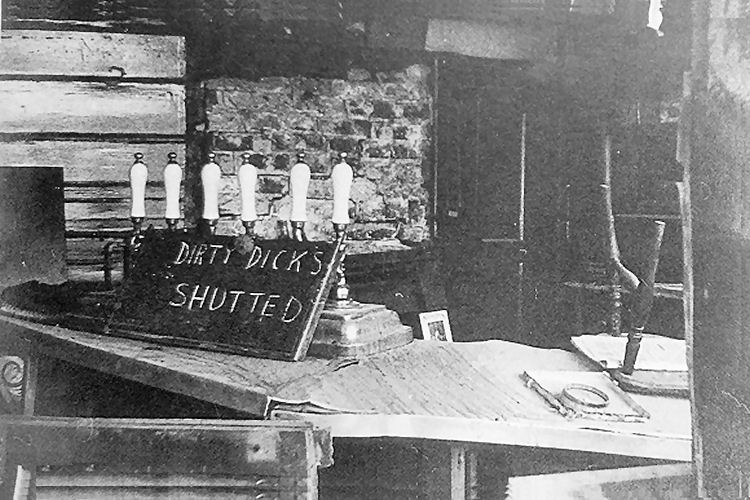
Above photo showing the inside of the pub in 1942, kindly sent by Rory
Kehoe who says the following:-
"I'm not sure if this next bit is strictly true but let's say it is!
The pub had previously been the "Freemason's Inn" but the Baedeker raid
put paid to the north side of the building, which included the
accommodation and the undercroft, under which which carriages, cars etc.
accessed the old stable yard. All this is 100% correct. With no
accommodation, the "Freemason's Inn" could no longer accommodate bona
fide travellers and was, therefore, downgraded to being a mere Tavern.
Sounds fair to me! However, the "Fremason's Tavern" was still knocked
about pretty badly and there was some delay in it re-opening. The
regulars referred to their local as "Dirty Dick's" and some wag, rather
poignantly, placed this sign by the beer pumps! |
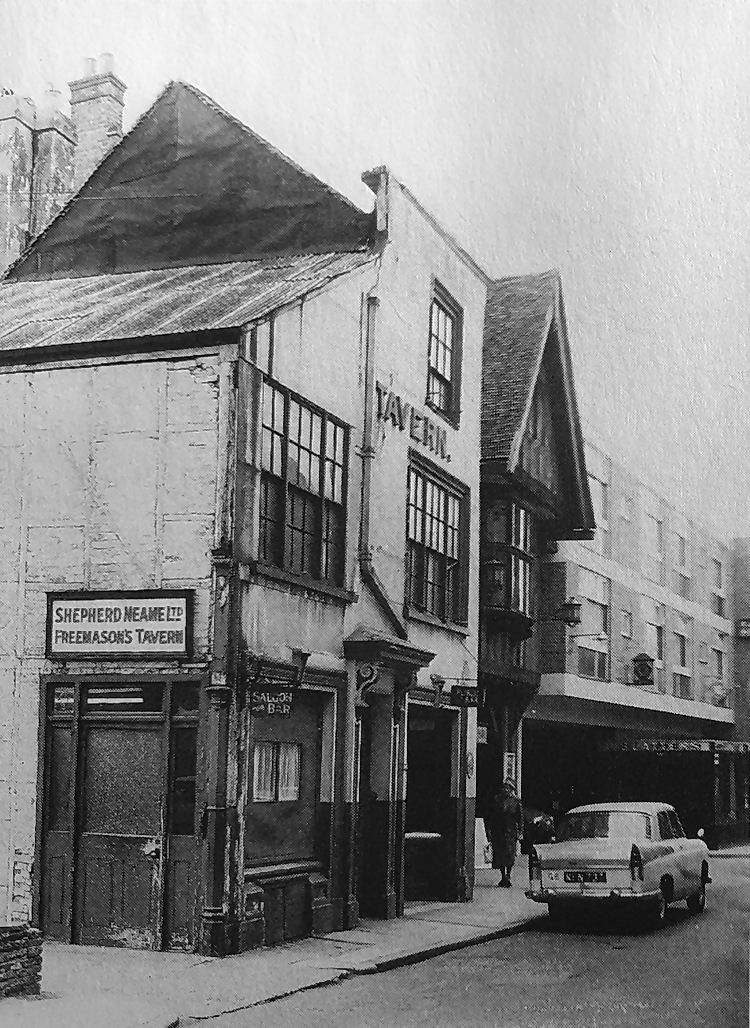
Above photo 1965. |
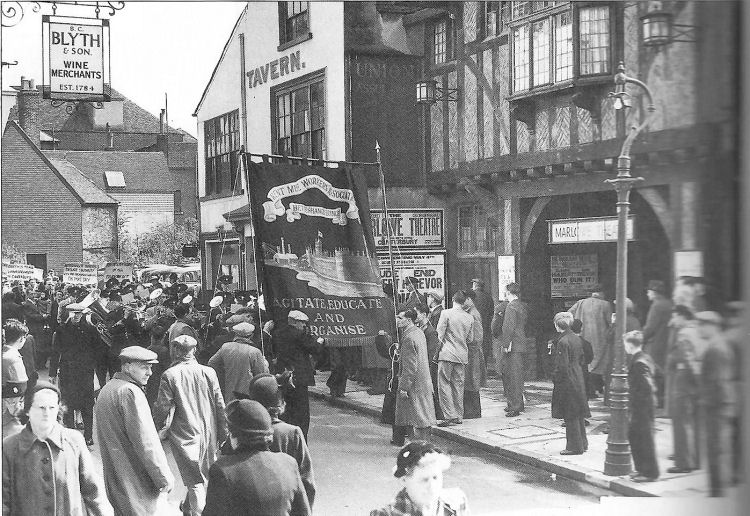
Above picture from 1965 shows a miner's May day rally outside the old "Marlow
Theatre." To the left of that is the "Freemason's Tavern." |

Pictured in the period between the Council's compulsory purchase and the
pub's demolition circa 1965, as part of property clearance for the
proposed "Parallel High Street" plan. Quite a few old, attractive and
much-loved buildings were compulsorily purchased by the Council and
quickly flattened but then, some common sense prevailed and the parallel
High Street plan come to nothing. Sadly, too late for the Freemason's
Arms. Kindly sent by Rory Kehoe. |
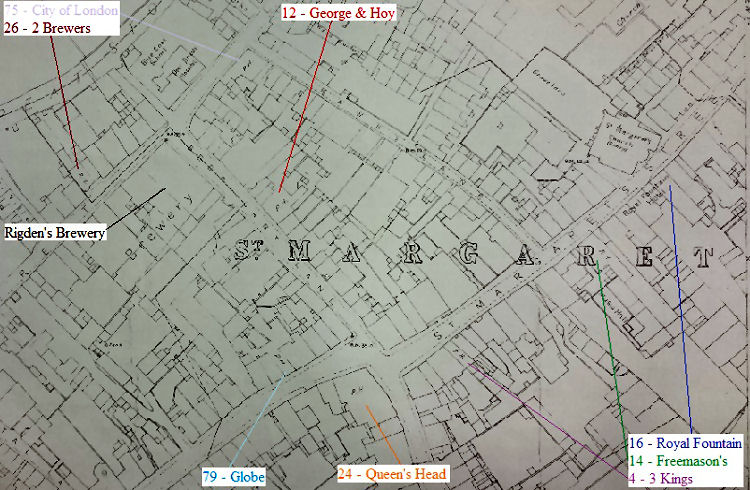
Above map 1874 identified by Rory Kehoe. |
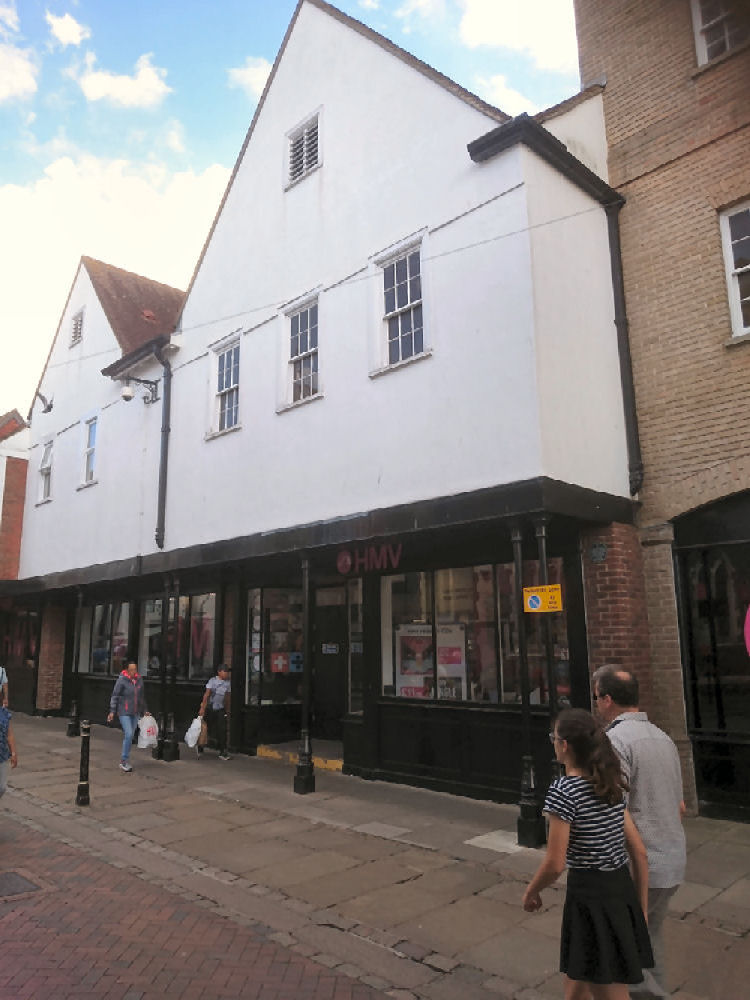
Above photo, August 2017, kindly taken and sent by Rory Kehoe. |
Originally called the "Mermaid"
the house had changed name by 1858.
In 1917 the premises was also referred to as the St. Margaret's Hall and
the Y.M.C.A. branch held its meetings there.
14A St. Margaret's Street was owned by Gardner & Co, Ash Brewery, as
their Brewery Office in 1889, and were advertising their Family Bitter Ale,
4 1/2 Gallons 4/3 & 6/3 For Cash on Delivery. Full price list on application
at the stores. Canterbury, Dover, Hastings, Ashford, Ramsgate,
Sittingbourne. In 1917 the manager was named as E. J. Martin
The pub closed on 5 April 1965 and the licence held in suspense following
compulsory acquisition.
|
Kentish Gazette, 17 March 1857.
Yesterday.
ASSAULT OF THE POLICE BY SOME OF THE MILITARY.
Two privates, in the 79th Highlanders, named William Gilchrist and
Matthew Gemmell, were had up on a charge of violently assaulting the
police in the execution of their duty. It appeared by the evidence
of Inspector Parker that as he was passing down the High-street,
shortly after eleven the previous night, he found Mr. Usher, of the
"Freemasons’ Tavern," following the defendants, whom he was desirous
of giving in charge for breaking two windows at his house; whereupon
he took hold of Gilchrist, and Mr. Usher took hold of the other. A
scuffle ensued in which Gilchrist broke from his custody, and struck
him from behind a violent blow on the head, which laid it open to a
considerable extent, and prostrated him. Gilchrist then ran away. He
(the Inspector) seized the other man, who kicked and struggled so
violently that he also got away. At half-past one in the morning he
arrested Gemmell at a coffee shop, in the borough, when he resisted
very violently, but was secured. There was an assemblage of some 15
or 16 persons when the scuffle took place, yet none would render him
assistance.
Police-constable Samson, seeing the mob, went to the spot, when
Parker’s head was bleeding from the blow which he had received.
Witness afterwards went to a coffee shop, in King-street, with
Manuel; and charging Gilchrist as his prisoner for breaking windows
and assaulting Inspector Parker he seized a poker and with great
violence aimed two severe blows at him, which he avoided, and a
Dragoon afterwards took the weapon from him. When in the street he
kicked and struck and resisted with great violence; and the other
tried to rescue the prisoner, and going out returned with five
Dragoons — all of whom attacked him, knocked him down and kicked
him. Gemmell then ran away, but was subsequently apprehended, and
conveyed to the station. Witness bore striking evidence of the
ill-usage he had received.
Police constable Manuel corroborated the evidence of the assault on
Samson on the evening described, and spoke of Gemmell having struck
him. When at the police station he said they would pot care for six
months if they got their discharge.
The clerk having pointed out that the bench had power to fine the
defendants £5. and in default commit them to prison for three
months, or if they felt that not severe enough, to send them to the
quarter sessions and there indict them, the bench fined each 20s.
and costs, and in default committed them to St. Augustine’s for a
month. The men treated the sentence with the utmost levity, and it
was generally felt that it was not near severe enough, as the
assault was of an aggravated and cowardly nature. We hope, however,
that if disturbances of this nature, and this is by no means a
solitary case, the military authorities will abridge the indulgence
of allowing so many men out of barracks at night. The men convicted
in the present instance had committed damage at another place, in
respect of which no charge was preferred.
|
|
South Eastern Gazette, 12 March, 1860.
BIRTH.
On the 8th inst., at the "Freemasons’ Hotel," Canterbury, the wife
of Mr. W. H. F. Moore, of a son.
|
|
From the Dover Express, 17 March 1860.
BIRTHS.
March 8, at the "Freemason's Hotel," Canterbury, the wife of Mr. W.
H. F. Moore of a son.
|
|
South Eastern Gazette, 26 June, 1860.
CANTERBURY COUNTY COURT.
The monthly sitting of this court was held on Wednesday last, before
C. Harwood, Esg , Judge.
Usher v. Lambert.
For the recovery of £2 2s., for the hire of three rooms and the use
of a bar at the "Music Hall Tavern," in St. Margaret's, in 1857,
during the cricket week; 15s. had been paid into court.
The defendant admitted the hiring of the rooms, but explained that
an opening was made from the "Music Hall tavern" to the ball room,
at an expense of £6 or £7, and which was considered of advantage to
the house. This (with the 15s. paid) he considered ample for the
accommodation afforded by the use of the rooms.
The plaintiff denied that the communication made into the hall was
of any advantage to him. He had not been treated properly in the
matter.
Judgment for the sum paid into court.
|
|
From the Southeastern Gazette, 15 May 1866.
ILLEGAL USE OF BASS AND CO.’S PALE ALE LABELS.
A case of considerable interest to the public came before the
magistrates on Thursday. It was an information taken out by Messrs. Bass
and Co., the celebrated brewers of Burton-on-Trent, against Mr. Gibbon
Ladd, ale and stout merchant, carrying on business in Burgate-street,
Canterbury, for illegally and fraudulently selling 17 bottles containing
ale on which were placed labels bearing the trade mark of Bass and Co.
Mr. Motheram, barrister, of the Oxford circuit, attended to prosecute,
and Mr. Delasaux appeared for the defendant.
Mr. Motheram, in stating the case, said the information was laid under
the 25th and 26th Vic., c. 88, sec. 4, and it charged Mr. Ladd with an
offence against that statute. Mr. Ladd was formerly a customer of
Messrs. Bass's, but trading with him had been discontinued. About twelve
months ago, however, he ordered a quantity of ale, and it was sent him,
together with 3,000 labels, containing the well-known trade mark of the
firm, which was a sufficient quantity to place on the bottles necessary
to hold the quantity sent. There had been no sale of their bottling ale
to Mr. Ladd since that time. The learned gentleman, having read the
clause, and stated that the proceedings were instituted by Messrs. Bass
and Co. for the protection of the public, proceeded to state the facts
of the case as borne out by the following testimony:—
John Walker stated:— I am a traveller in the employ of Messrs Bass and
Co., brewers, Burton. In consequence of certain suspicions I sent Henry
Jarvis to the defendants to purchase some pale ale on the 7th February
last. I received six bottles, and afterwards ordered a dozen bottles in
a hamper. These were brought me by Jarvis, and purported to have been
sold by a man named Dunkin, on behalf of the defendant. I marked the
labels and corks attached to the bottles so received, and sent them to
my employers. I produce invoices signed by Dunkin and Ladd. I have had
considerable experience in tasting ales, and I believe the ale produced
is not Bass’s, but Scotch ale.
Cross-examined:— Henley and Son are customers of ours. They can do what
they like with our ales. I should say that Scotch ale is not superior to
Bass’s — I believe Bass’s to be the best ale.
Henry Jarvis, a youth living at the “Freemasons’ Hotel,” stated that on
the 7th Feb. he went to Mr. Ladd’s stores, and asked for half a dozen
bottles of Bass’s pale ale. He gave the order to Mr. Ladd, who put
labels upon the bottles and handed them to him. Witness did not pay. On
The same day he went again to the defendant’s, and ordered three dozen
of ale; one dozen to be packed in a hamper. This was delivered at the
“Freemasons’ Hotel” to Mr. Walker, who marked the corks and the labels
in witness’s presence.
Cross-examined:— They were supplied by Mr. Ladd’s son. He had never seen
the defendant at the stores, although he frequently went there. He knew
the man who brought the ale to the “Freemasons' Hotel” to be in Mr.
Ladd’s employ, because he had seen him at work at the stores.
Moses Fright, agent to Messrs. Pickford, proved receiving the hamper
from Mr. Walker. He had not delivered any of Messrs. Bass’s ale to the
defendant within a twelvemonth. He had delivered Tetley’s and Younger’s,
he believed before the 7th Feb. The witness subsequently produced a
record showing that it was in October that the last delivery took place.
John Matthews:— I am a chemist, and the head brewer in Messrs. Bass and
Co’s brewery at Burton-on-Trent. Since July last they have brewed
187,000 quarters of malt, producing 600,000 barrels of beer.
Mr. Delasaux:— I do not see what this has to do with the case. It
certainly is an excellent advertisement for Messrs. Bass and Co.
Mr. Motheram:— Then I have no doubt the reporters present will consider
that in making use of the statement they are supplying important
information to the public.
Witness continued:— I received a hamper sealed containing bottles
bearing Messrs. Bass’s ale labels. I examined one or two bottles on the
day of receiving them, and subsequently analysed nine bottles in all.
The result of the analysis was that I found them to vary from a specific
gravity of 1.053 to 1.055. Having made that analysis I am quite certain
that the ale I examined was not Bass’s pale ale, and never had been; our
standard gravity for pale ale is 1.064. Some brewings will come up to
1.066, and others will be as low 1.063. Every brewing is tested by me by
the saccharometer before fermentation. We brew every five hours, and at
the end of the day, to obtain the average gravity, the brewings are
amalgamated. We do not allow any of our pale ale to be made below 1.063;
1.064 is our standard. After fermentation the saccharometer would not
give the gravity, but in order to obtain the original gravity we resort
to an analysis by a process of distillation; it is recommended by the
revenue and by Drs. Hoffman and Graham. By this means we can ascertain
what the gravity of the ale was before brewing as measured by the
saccharometer. Therefore I have no doubt, after having made this
analysis, that the ale contained in the bottles was never Bass’s ale.
The label on the bottles is that used for Messrs. Bass’s pale ale.
Cross-examined:— It is from the gravity only that I judge the ale not to
be Messrs. Bass’s. Supposing it was Allsopp’s ale and the gravity was
1.063, 1 should not have been able to ascertain for certain that it was
not our ale but I should have an opinion that it was not. The gravity
was 1.053 to 1.055.
Re-examined:— The ale in the bottles is about one-half the value of
Bass’s. If we found that one of our best customers was bottling any ale
but the 60s., we should cease to trade with them. I believe Allsopp's to
be about the same standard as ours, having analysed it.
Dr. Fraukland, professor of chemistry at the Royal Institution and
College, stated:— I received some ale from Mr. Matthews, which I
submitted to an analysis. The original gravity varied from 1.053 to
1.055. The differences between my analysis and Mr Matthews’s is hardly
appreciable. I agree with what Mr. Matthews has stated.
Mr. Delasanx, in his address to the Bench, put it to the magistrates
whether they were convinced from the statement of Mr. Matthews and Dr.
Frankland, that the ale was not Mr. Bass’s. That was the first question
for their consideration, and if the Bench decided against his client
they would then have to consider whether the sales were made with the
knowledge of the defendant, who was seldom at the stores, having
business elsewhere. Should the magistrates determine that both points
had been proved to their satisfaction, he must leave his client’s case
in their hands.
Mr. Motheram said that, considering the honourable way in which the
charge had been met by Mr. Delasaux, Messrs. Bass would be satisfied if
the fine levied was the minimum penalty. In instituting the prosecution,
Messrs. Bass were actuated by no ill-feeling against Mr. Ladd, their
object being to protect the public.
A fine of 10s. and costs was then inflicted.
Mr. Delasaux having thanked Messrs. Bass, through Mr. Motheram, for the
spirit of liberality they had evinced towards his client, the
proceedings, which created considerable interest, terminated.
|
|
From the Southeastern Gazette, 26 June 1866.
A Public-house Fracas.
Herbert Claris was summoned at the City Police Court, yesterday, for
refusing to leave the “Freemasons’ Tavern” late on Saturday night. P.S.
Elvey deposed that after closing time on Saturday night he was requested
to eject the defendant from the tavern. Directions were given him by
Miss Abrahams, who was in charge of the house. Claris refused, and he
removed him forcibly. The defence was that Claris was in the house
visiting a friend, and that the constable had exceeded his duty in
forcibly ejecting the defendant.
Fined 18s., costs 7s.
|
|
From the Whitstable Times and Herne Bay Herald, 2 June 1900. Price 1d.
CANTERBURY POLICE COURT, FRIDAY.
Before Mr. J. Cox (in the chair), Mr. J. Hunt, and Mr. H. G. Sadler.
THE MUSIC HALL AND THE STAGE PLAY.
Mr. Lang, proprieties of the "Freemasons' Hotel," was summoned for on
the 16th May allowing a stage play to take place in the Music Hall
without getting the consent of the Town Council.
The defendant, who was represented by Mr. Scripps, pleaded not guilty.
Superintendent Farmery stated that on Wednesday, the 16th, he went to
St. Margaret's Hall at about 9.30 p.m. The hall formed part of the
licensed premises of the "Freemasons' Hotel," and there he saw a
laughable sketch being played by Mr. Arthur Roberts and Company. The
title of the sketch was "Stop, thief, or Desperation.” There were five
persons, including Mr. Roberts, in the performance. There was no
singing; it was all speaking. The play lasted about a quarter of an
hour. In cross-examination witness said he did not get the name of the play
from Mr. Graham Falcon. Mr. Falcon was present, but he was not bringing
these proceedings. Witness took them himself. He did not hear one of the
company announce that as the hall was not licensed only selections would
be given from the sketch. Mr. Scripps called Mr. Victor Roi, who deposed that be was a theatrical
provider. He made an arrangement with Mr. Roberts to come down and give
an entertainment at St. Margaret's Hall. He engaged him as a concert
party. When the bills were sent to witness a stage play was advertised,
viz. a sketch called "A Race for a Thousand Pounds." Witness ordered the
printing. On the evening of the 16th May witness told Mr. Roberts that
the hall was not licensed for stage plays. Mr. Roberta replied " Very
well, then we will give selections from the sketch.” It was not a stage
play as given by Mr. Roberts. Witness wrote to Mr. Roberts when Mrs.
Lang received the summons, and Mr. Roberts wired and referred witness to
the author of the sketch in London, who had had it acted time after time
in the London music halls, and no notice had ever been taken of it. The Chairman and the magistrates considered a breach of the law had been
committed. The defendant was liable to a fine of £20, but as this was
the first time she had been before them, they would deal leniently with
the case, and only impose a fine of £1 with costs. |
LICENSEE LIST
USHER John 1857-58+

MOORE William H F 1860-62+ (age 32 in 1861 ) )
 
BEKEN A 1868+

SKINNER John 1874+

GOLDSMITH Alfred W 1881+ (age 35 in 1881 ) )

GILLETT F 1882+

FEWSON H 1889-91+
 
HOOKER John W 1891+ (age 45 in 1891 ) )
DUCKER Arthur 1911+ (age 48 in 1911 ) )
JEFFREY George William 1917+

HOLLOWAY James 1940+
BAXTER W G 1949+
https://pubwiki.co.uk/FreemasonsTavern.shtml
 From Melville's Directory 1858 From Melville's Directory 1858
 From the Post Office Directory 1862 From the Post Office Directory 1862
 From the Post Office Directory 1874 From the Post Office Directory 1874
 Census Census
 From the Post Office Directory 1882 From the Post Office Directory 1882
 From the Post Office Directory 1891 From the Post Office Directory 1891
 Historic
Canterbury web site www.machadoink.com Historic
Canterbury web site www.machadoink.com
 Greens
Canterbury Directory 1868 Greens
Canterbury Directory 1868
|





